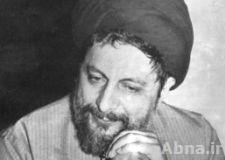(Ahlul Bayt News Agency) - Imam Moussa Sadr did not believe that Islam is a closed system. He was agreed that Islamic objectives are fixed, but believed that the people choose their type of governance appropriate with their time, said a researcher in religion and society on Saturday. “The Focal point of the activities of Imam Moussa Sadr was reforms in social system, but he had meanwhile not forgotten the need for reforms in individuals’ behaviors,” said Mohammad Javad Sahebi in a conference titled Imam Moussa Sadr’s Role in Continuity of Revival of the Religious Mentality, Saturday evening.He said that in the thoughts of such other grand Islamic personalities as Martyr Mohammad Beheshti and Martyr Morteza Motahhari, too, this ideas can be found.Sahebid added, “The fundamentals of this type of reforms are derived from the Glorious Qur’an and the personality traits of the infallible household of Prophet Muhammad (P), and this context is not subject to change.”He criticized viewing the façade of the fundamentals of religion, saying, “Imam Moussa Sadr believed that such fundamentals are in need of new interpretations and readings.”The researcher in religious and social affairs said that disregarding such basics leads to one’s slipping into the Salafi and Takfiri realms, adding, “The problem with the Salafis, too, is that they say the façade of Qur’an and the Prophet’s traditions are sufficient proof for us, which is also the reason why the Wahhabies were opposed to the civilizational phenomena.”Defining fundamentalism and the need to comprehend such terminologies, he said, “Fundamentalism means returning to the time of the advent of Islam and this means depriving Islam of all it’s worth and burying it in the past.”Sahebi emphasized that the great reformers were after reforming such mentalities which had unfortunately affected a portion of the religious and scientific society.He added, “The fundamentalists and the reformists, too, need to define their distinctions with the traditionalists and the modernists.”Defining reformism, he said, “Reformism (in Islam) means progressing with Islam in accordance with the needs of the day, and that is what Imam Moussa Sadr had managed to do.”The researcher in religions and societies noted that Imam Moussa Sadr in his articles emphasized that the human beings are free and that the political systems are in need of reforms.He said, “It will not be sufficient to collect the articles and sayings by Imam Moussa Sadr as serious work is needed for elaboration on the thoughts of that personality.”Imam Moussa Sadr (15 April 1928 – disappeared on 31 August 1978) was an Iranian-Lebanese philosopher and Shi’a religious leader who disappeared in August 1978.Due to the lasting influence of his political and religious leadership in Lebanon, he has been referred to as a towering figure in modern Shia political thought and praxis.Imam Moussa Sadr was born in Qom, Iran, on 15 April 1928 to the prominent Shia Lebanese Sadr family of theologians. His father was Ayatollah Sadreddin Sadr, originally from Tyre. He was a source of jurisprudence in Iran. His grandfather, Seyyed Ismail Sadr, was born in Lebanon and was a leading source of jurisprudence in Iraq.Imam Moussa Sadr attended primary school in his hometown and then moved to the Iranian capital Tehran where he received a degree in Islamic jurisprudence (Fiqh) and political sciences from Tehran University. Then he moved back to Qom to study Theology and Islamic philosophy under Allameh Mohammad Hossein Tabataba’ie. He then edited a magazine called Maktab-e Eslam in Qom. In 1953 following the death of his father he left Qom for Najaf to study theology.In 1960, Imam Moussa Sadr accepted an invitation to become the leading Shia figure in the city of Tyre to succeed former Shia leader of the city, Abdul Hussein Sharifeddin, who died in 1957. Moussa Sadr, who became known as Imam Moussa, quickly became one of the most prominent advocates for the Shi’a population of Lebanon, a group that was both economically and politically disadvantaged. He is said to have:worked tirelessly to improve the lot of his community - to give them a voice, to protect them from the ravages of war and inter-communal strife.On 25 August 1978, al-Sadr and two companions Sheikh Muhammad Ya’qoub and journalist Abbas Badreddin departed for Libya to meet with government officials.The visit was paid upon the invitation of the then Libyan ruler Muammar Gaddafi. The three were seen lastly on 31 August. They were never heard from again.It is widely believed that Gaddafi ordered Imam Moussa Sadr’s killing. Libya has consistently denied responsibility, claiming that Imam Moussa Sadr and his companions left Libya for Italy.Imam Moussa Sadr’s son has claimed that he remains secretly in jail in Libya. Imam Moussa Sadr’s disappearance continues to be a major dispute between Lebanon and Libya. /129
source : IRNA
Saturday
26 October 2013
8:30:00 PM
475889

